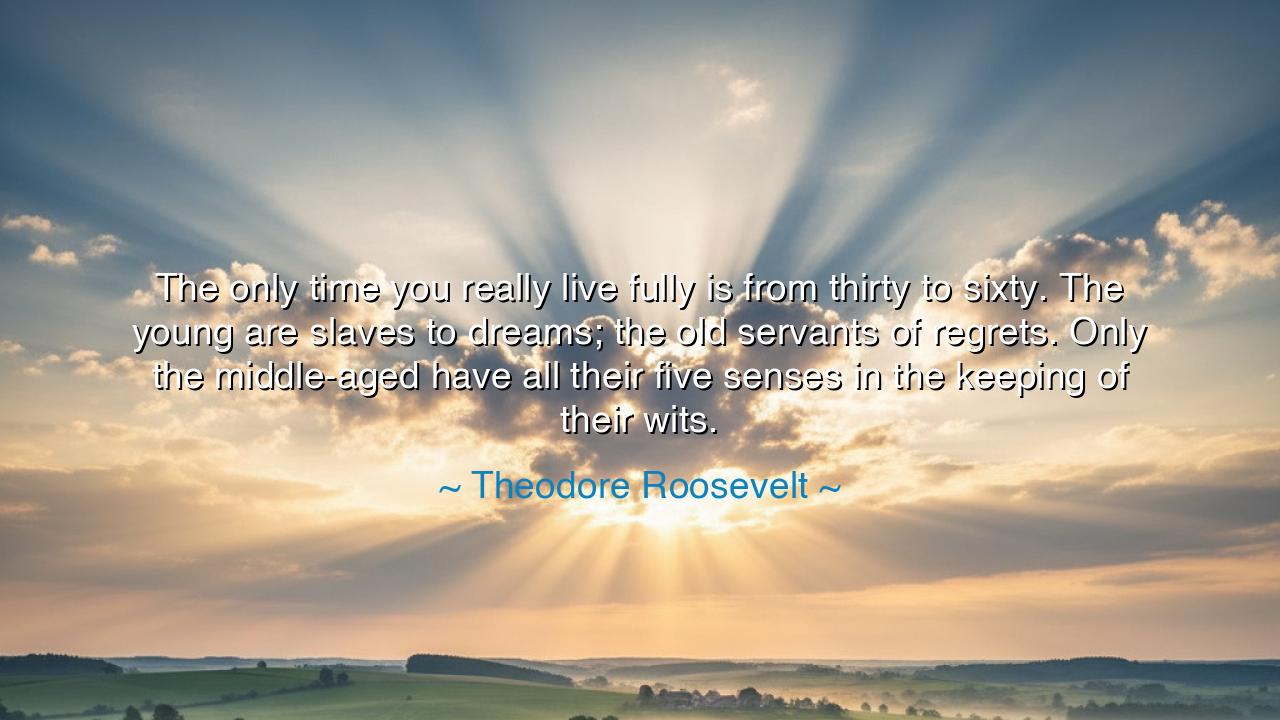
The only time you really live fully is from thirty to sixty. The
The only time you really live fully is from thirty to sixty. The young are slaves to dreams; the old servants of regrets. Only the middle-aged have all their five senses in the keeping of their wits.






"The only time you really live fully is from thirty to sixty. The young are slaves to dreams; the old servants of regrets. Only the middle-aged have all their five senses in the keeping of their wits." — Theodore Roosevelt
In these bold and reflective words, Theodore Roosevelt, the warrior-statesman and philosopher of action, speaks of life not as a straight line, but as a fire that burns at different intensities in each season. He declares that true living — the deep, conscious, and balanced experience of existence — belongs to those between thirty and sixty, when passion and wisdom meet, when the heart still burns but the mind has learned to command its flame. For Roosevelt, the young live in dreams untested by reality, and the old dwell among the shadows of memory. But the middle-aged, tempered by trial yet unbroken by time, stand at the summit of life — fully awake to both the beauty and the burden of being alive.
Roosevelt himself spoke from the furnace of experience. He had lived more lives than most men dare to dream: a sickly boy who built himself into a titan through willpower; a soldier who charged up San Juan Hill; a president who faced nations and wilderness alike with courage; a man who lost his wife and mother in one day and yet rose again to serve his people. He knew the folly of youth — its haste, its hunger for glory — and he knew the melancholy of age — its quiet surrender to nostalgia. But between these two, he found a golden mean, a time when courage, reason, and vitality walk together.
To say that “the young are slaves to dreams” is not to scorn youth, but to acknowledge its blindness. The young heart is full of hope but often empty of wisdom. It dreams of conquering the world but has not yet learned the world’s weight. It is enslaved to the future, chasing what has not yet come, living not in the present but in the mirage of what could be. Dreams, though noble, can bind the mind if not balanced by discipline. The young live in a storm of ambition — glorious, yes, but consuming. Roosevelt, ever the realist, reminds us that freedom lies not in dreaming, but in mastering one’s dreams.
Likewise, when he says “the old are servants of regrets,” he mourns the quiet sorrow that comes when a man looks backward instead of forward. The aged soul, having seen too much loss, too many chances vanished, can become a captive of remembrance. The old often serve their regrets as kings — replaying moments they cannot change, speaking to ghosts that do not answer. The danger of age is not weakness of body, but the heaviness of the past pressing upon the spirit. Roosevelt, who faced death many times, knew that one must never let memory harden into despair. The past is a teacher, not a tyrant.
Between these two extremes stands the middle-aged man, the one who “has all his five senses in the keeping of his wits.” This, Roosevelt proclaims, is the age of balance — the season of full awareness. The fire of youth still glows, but the hand that holds it is steady. The mind no longer rushes toward fantasies nor lingers in regret; it lives in the present with clear eyes. At thirty to sixty, one knows both victory and failure, both joy and grief — and through them gains the wisdom to live deliberately. It is the time when a person’s strength and reason, passion and prudence, are finally joined in harmony.
History offers countless mirrors to Roosevelt’s insight. Consider Marcus Aurelius, the philosopher-emperor of Rome, who wrote his Meditations not as a young dreamer nor as an aged lamenter, but as a man in the midst of his years — commanding armies, governing an empire, and yet reflecting deeply upon virtue, duty, and mortality. Like Roosevelt, Aurelius understood that the middle of life is not a decline but a culmination. It is when the mind’s wisdom guides the heart’s fire toward deeds of lasting worth. Both men, separated by centuries, shared the same creed: to live actively, to think deeply, and to serve nobly in the height of one’s powers.
Thus, the lesson is clear: do not mourn the fading of youth, nor fear the approach of age. Each season has its gift, but the richest harvest comes when vitality and insight unite. Cultivate the wisdom that tempers passion, and the passion that animates wisdom. Work hard, love fiercely, act with purpose — and do so while your strength and mind are still one. Do not be the dreamer who never acts, nor the elder who only remembers. Be the one who lives — fully, presently, completely — in the great middle years, when you hold both the memory of youth and the foresight of age in the keeping of your wits.






AAdministratorAdministrator
Welcome, honored guests. Please leave a comment, we will respond soon